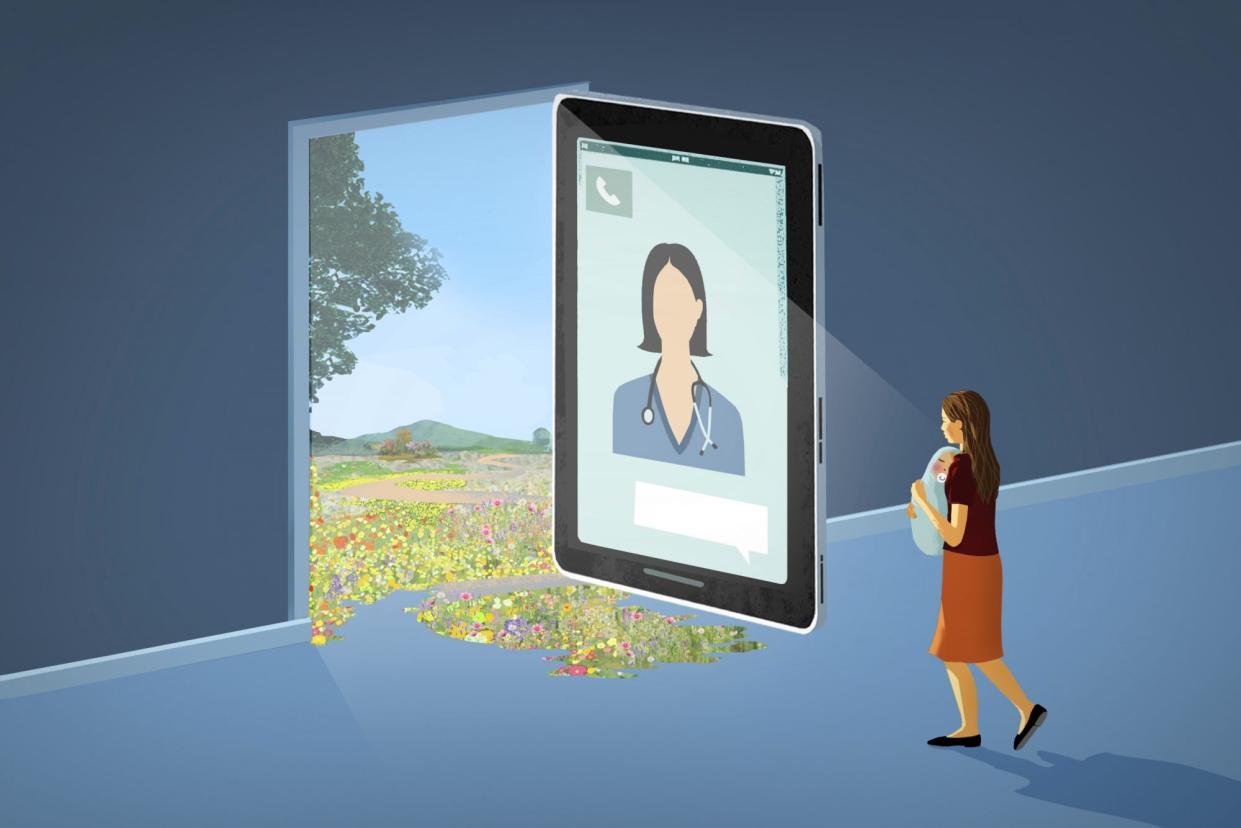Telemedicine Could Be the Help Postpartum Parents Need

Telemedicine—being seen, diagnosed, or treated digitally by a healthcare professional—is officially more than a buzzword: From 2005 to 2014, digital visits saw an average 52 percent in growth per year; today, about 76 percent of U.S. hospitals connect patients to practitioners this way; by 2025, telemedicine is projected to be more than a $64 billion business in this country.
And while it can be useful for many people and an array of health conditions (everything from the common cold to mental health), telemedicine is proving increasingly popular with a particular population: Postpartum women.
"About 25 percent of the sessions in my practice with pregnant, perinatal loss, and postpartum moms are done virtually through a HIPAA-compliant, encrypted video platform," says Katayune Kaeni, Psy.D., a Claremont, California-based psychologist specializing in pregnancy, birth, and postpartum.
RELATED: Telemedicine in Schools
Thinking about talking things out via technology? Here, some benefits, drawbacks, and tips to keep in mind:
The Benefits of Postpartum Telemedicine
If you just had a baby and are struggling with the blues, anxiety, or just want someone to talk to (all normal!), getting out of the house with a newborn can be, well, downright difficult. To that effect, Dr. Kaeni says that many of her clients appreciate the convenience, flexibility, and ability to still care for their babies while getting therapy in the comfort of their own home.
"Sometimes after delivery and getting home, it's hard to get out of the house for various reasons," she says. Think mobility and physical issues after delivery; the exhaustion of having a newborn; having medically vulnerable moms or babies; having a baby in the NICU; having multiple children; having no child care—the list goes on.
Have symptoms of postpartum depression, anxiety, or other conditions such as obsessive-compulsive disorder (OCD) or post-traumatic stress disorder (PTSD)? That can make it even harder to go anywhere. "These conditions can make people feel worried, hypervigilant, exhausted, alone, and isolated even when they are able to get out of the house," says Dr. Kaeni. "Being able to access psychotherapy and support while you feel stuck at home can be a lifeline."

Illustration by Eva Vázquez
Another benefit of telemedicine, specifically for perinatal mental health conditions, is that sometimes there aren't enough local therapists who have adequate training in perinatal mental health. "Being able to find one virtually within your state can get you the specialized treatment that you need," explains Dr. Kaeni.
A digital appointment could also break down barriers beyond a commute or accessibility. After all, while in-person postpartum screenings for depression and anxiety are important and useful, Catherine Birndorf, M.D., co-founder of The Motherhood Center of New York and author of the book What No One Tells You: A Guide to Your Emotions From Pregnancy to Motherhood notes that many women don't tell the truth on them (for fear of being seen as a "bad mom" or simply wanting to get out of the hospital or the doctor's office). A telemedicine appointment in the privacy of one's own home might allow someone to be more open and honest.
The Drawbacks of Digital Appointments
Telemental health certainly has its benefits, but so does in-person care.
While Dr. Birndorf notes that teletherapy for postpartum moms is a "net positive" as it provides access for people who otherwise might not get therapy, she says that she likes to be in the room for the patient. "There's just so much you can tell from that in-person experience," she says. "I use my body as a barometer; what it feels like to be in a room with a patient is really important psychiatrically."
For example, in person, a therapist may be able to pick up on important signs or symptoms that could be missed digitally due, in part, to a lack of true eye contact, notes Dr. Kaeni.
Some people also simply don't feel as connected during a telemedicine appointment, adds Dr. Kaeni. She's also heard from some moms that they prefer an in-person appointment because that helps them get out of the house.
Where to Start If You Want to Give Telemedicine a Go
If you're interested in trying teletherapy postpartum, the good news is that many insurance companies do cover telemental health services.
To find a telemedicine specialist, word of mouth and referrals can always be a good place to start, says Dr. Birndorf. There are also many online therapy search engines, including Postpartum Support International, which has a growing online directory where you can search for vetted perinatal mental health specialists.
Ultimately, though, no matter how you seek care—online or in person—if you're struggling with postpartum emotions, it's important to find the help you need. "Becoming a mother is one's own developmental process and the enormity and gravity of it are not to be underestimated," says Dr. Birndorf. "This is one of the profound life changes anyone can go through. It requires processing and reflecting upon and talking about."
Having an empathic, understanding ear to listen to you is important. After all, in cases of mild to moderate postpartum anxiety or depression, Dr. Birndorf notes that simply talking to someone can help you avoid medication or other forms of intervention.

